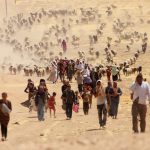As a full-time seminary student, I often suffer from theological burnout. After reading hundreds of pages of Augustine, Aquinas, Luther, and Tertullian, nothing sounds quite as refreshing as unwinding with a few episodes of The Office or The Great British Baking Show.
Recently, though, I decided to check out a comedy series I knew nothing about: NBC’s The Good Place. But rather than finding another forgettable sitcom, I discovered something so much more: perhaps the smartest, most original, and most intriguing show on television.
The Good Place, which recently concluded its second season, is many things, but a respite from theological inquiries and ethical conundrums it most certainly is not.
Show About Heaven (But Not the Heaven of the Bible)
The Good Place stars Kristen Bell as Eleanor Shellstrop. When we meet Eleanor, she’s sitting alone on a couch in a sparse waiting room with the words “Welcome! Everything is fine” written on the wall. Michael (a perfectly cast Ted Danson) opens the door and calls Eleanor into his office, where he informs her that she has died and is now in The Good Place, that is, heaven. This isn’t the heaven of the Bible, though. When it comes to the afterlife, “Hindus are a little bit right, Muslims a little bit, Jews, Christians, Buddhists,” Michael says. “Every religion guessed about 5 percent.”
In the universe of the show, everyone’s deeds are tracked from the moment they’re born until their final breath. If your good works on earth outweigh the bad, welcome to The Good Place! Upon arrival, residents discover a neighborhood where “every detail has been precisely designed and calibrated” for their enjoyment. They move into their dream house and meet their one true soulmate. Those who don’t make the cut—“basically every artist ever, and every U.S. president, except Lincoln”—are sent to The Bad Place for an eternity of torture.
Michael, the architect of The Good Place, tells Eleanor her meritorious humanitarian work solidified her spot in the neighborhood. There’s only one problem: while she was alive on earth, Eleanor was a selfish, insufferable person. She’s been mistaken for a virtuous human-rights lawyer and actually belongs with the tormented souls in The Bad Place.
She confesses this sensitive information to her assigned soulmate, Chidi (William Jackson Harper), an anxious Senegalese ethics professor, who agrees to teach Eleanor how to be good so she can avoid detection and rightfully earn her spot in The Good Place. Chidi gives Eleanor (and the audience) a beginner’s guide to Immanuel Kant, Soren Kierkegaard, Utilitarianism, Aristotle, David Hume, Deontology, Existentialism, and, of course, the Trolley Problem, among many other philosophical concepts and thinkers. Her moral progress is tested through interactions with her neighbor, Tahani (Jameela Jamil), a self-absorbed socialite and philanthropist; Tahani’s soulmate, a purportedly silent Buddhist monk named Jianyu who actually turns out to be a “pre-successful” DJ named Jason (Manny Jacinto); and all the other residents of this divine community, especially Michael, the one person with the power to evict her from paradise.
Refreshing Moral Seriousness
This moral seriousness makes The Good Place a refreshing and thought-provoking show. Too much of our entertainment panders to the lowest common denominator, using contrived plot points and bawdy writing to score cheap laughs. The Good Place raises the bar, asking audiences to grapple with questions about what it means to be good, how we can truly love our neighbor, and whether or not we can justify ourselves on our own merits. For Eleanor and the gang, ethics is a matter of life and death—literally.
The Good Place asks audiences to grapple with questions about what it means to be good, how we can truly love our neighbor, and whether or not we can justify ourselves on our own merits.
Comedy, it turns out, is a fitting vehicle for this grave subject matter; the writing is laugh-out-loud funny and unlike anything else on television right now. I don’t want to reveal any major spoilers, but suffice it to say that The Good Place has daring twists that one would never anticipate in a network sitcom. Indeed, nearly every episode left me with a deeper understanding of the complexity of human nature and my own countless failures to live up to the ethical standards I claim to hold.

Since premiering in 2016, the show has become a critical darling, garnering rave reviews and a devout fanbase. What are we to make of a story about the afterlife being one of the most popular shows on television in a time when it seems more and more people agree with the late Stephen Hawking, who viewed “the brain as a computer which will stop working when its components fail”?
Death—and what happens after our last heartbeat—remains a source of profound anxiety and fear. There is simply no way to know beyond a shadow of a doubt what awaits us on the other side—or if there even is another side. We often seek entertainment that allows us to ignore this solemn fact, at least for an hour or two. The Good Place, on the other hand, refuses to hide from the existential crisis we all share, choosing instead to face it with humor and profundity.
Is Anyone Good Enough for The Good Place?
If I’m honest, part of me longs for the black-and-white, right-and-wrong calculations of The Good Place. Lie to my professor: -100 points. Help a stranded driver fix her flat tire: +200 points. This system puts us in control of our fate, and whatever happens to us, for good or for ill, is because of our own doing. I like the idea of being responsible for my destiny. I could be good enough for The Good Place, I tell myself.
This understanding of the afterlife is in no way a fringe belief. In 2015, the Pew Research Center released a study showing that 7 in 10 Americans believed in a heaven “where people who have led good lives are eternally rewarded.” The predominant belief in America is that The Good Place is indeed a place we earn through behavior modification and ethical living. One only has to peruse a local bookstore or Amazon bestsellers list—yes, even the Christian titles, sadly—to recognize how deeply this self-help, “be your best self” message is ingrained in our collective consciousness. We yearn for the 12 rules, the proven how-to’s, the seven steps, the life-changing magic that will teach us how to accomplish more, find happiness, and be better—so that we can do what’s necessary to end up in The Good Place.
One only has to peruse a local bookstore or Amazon bestsellers list—yes, even the Christian titles, sadly—to recognize how deeply this self-help, ‘be your best self’ message is ingrained in our collective consciousness.
But is that really desirable? Because even our best works and noblest acts fall short, leaving us in desperate need of a Savior.
Eleanor is confronted with this reality when she realizes her acts of kindness were ultimately rooted in self-preservation. Under this criteria—this law—no one, not even Chidi, who has devoted his life to studying how to live ethically, passes the test each time. The hope of the gospel is not that if we do enough good we can be declared righteous, but that while we were sinners, while we were ungodly, Christ died for us, freeing us from the impossible burden of earning our way to The Good Place. The only thing we can do, the only thing we must do, is acknowledge that there’s nothing we can do; Christ has already done it all on the cross.
Being free from the law of self-justification, however, doesn’t mean Chidi’s ethics lessons have nothing of value for us. The crucial question The Good Place explores is this: How then shall we live? For Christians, the answer is that grace doesn’t depend on our good works, but grace does free us to do good works rightly.
“Because you have taken hold of Christ by faith, through whom you are righteous, you should now go and love God and your neighbor,” Martin Luther said in his lectures on Galatians. “These are truly good works, which flow from this faith and joy conceived in the heart because we have the forgiveness of sins freely through Christ.”
As Christians, our future with Christ is secure, and we can rest in that fact. The Good Place, though, is an oft-needed reminder that the way we live here and now, in our communities and through our vocations, has eternal ramifications.
Is there enough evidence for us to believe the Gospels?
 In an age of faith deconstruction and skepticism about the Bible’s authority, it’s common to hear claims that the Gospels are unreliable propaganda. And if the Gospels are shown to be historically unreliable, the whole foundation of Christianity begins to crumble.
In an age of faith deconstruction and skepticism about the Bible’s authority, it’s common to hear claims that the Gospels are unreliable propaganda. And if the Gospels are shown to be historically unreliable, the whole foundation of Christianity begins to crumble.
































